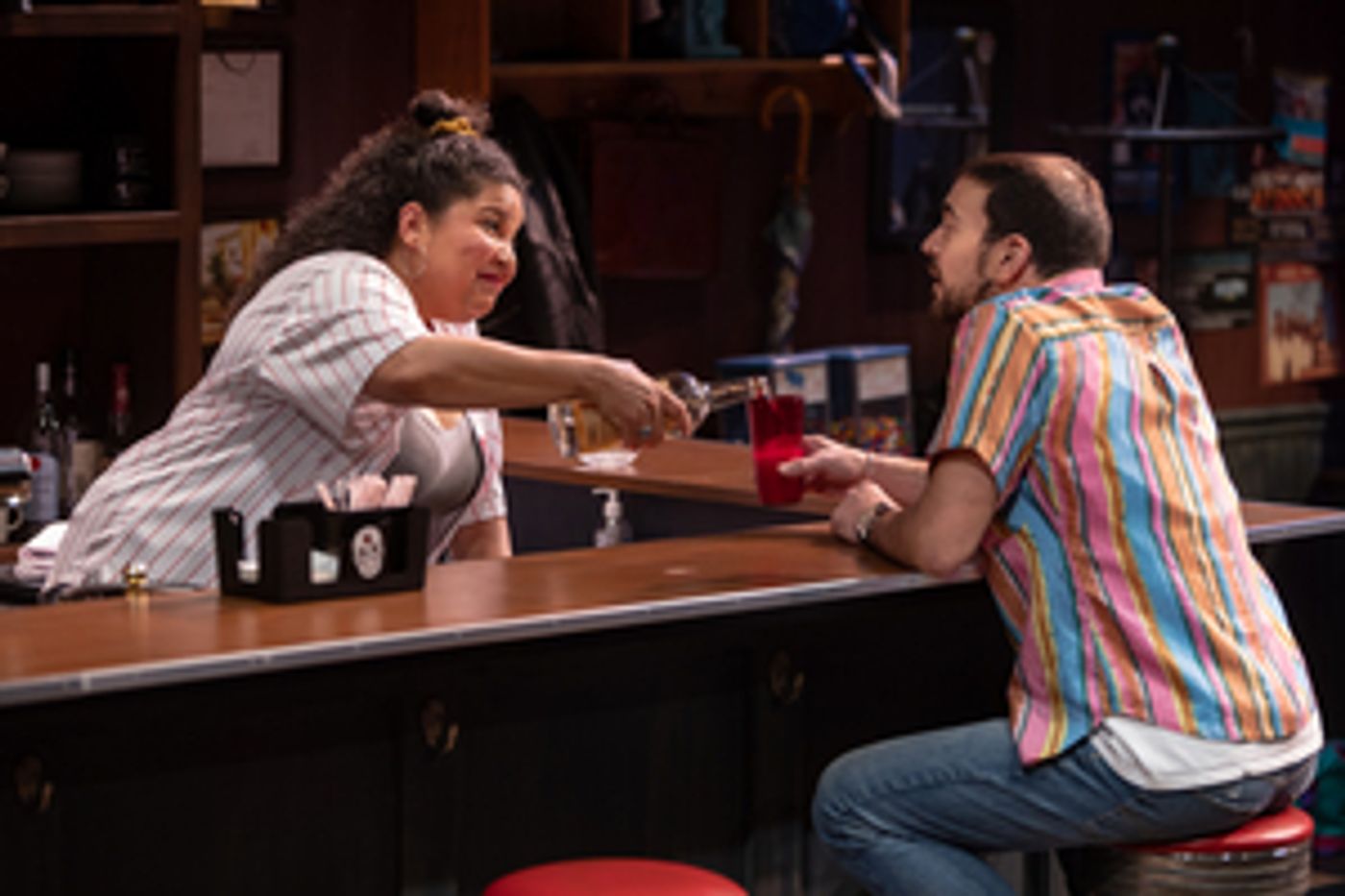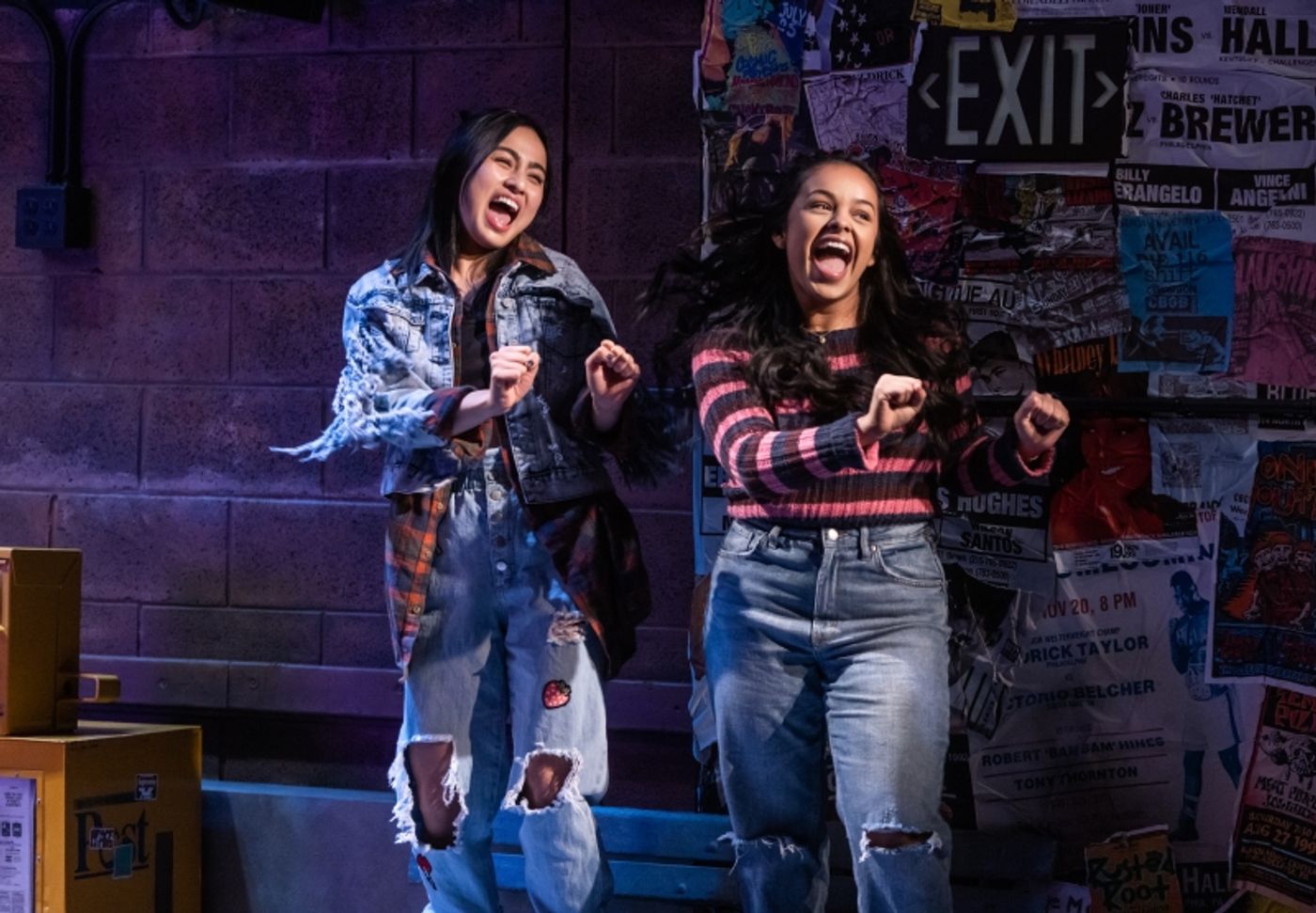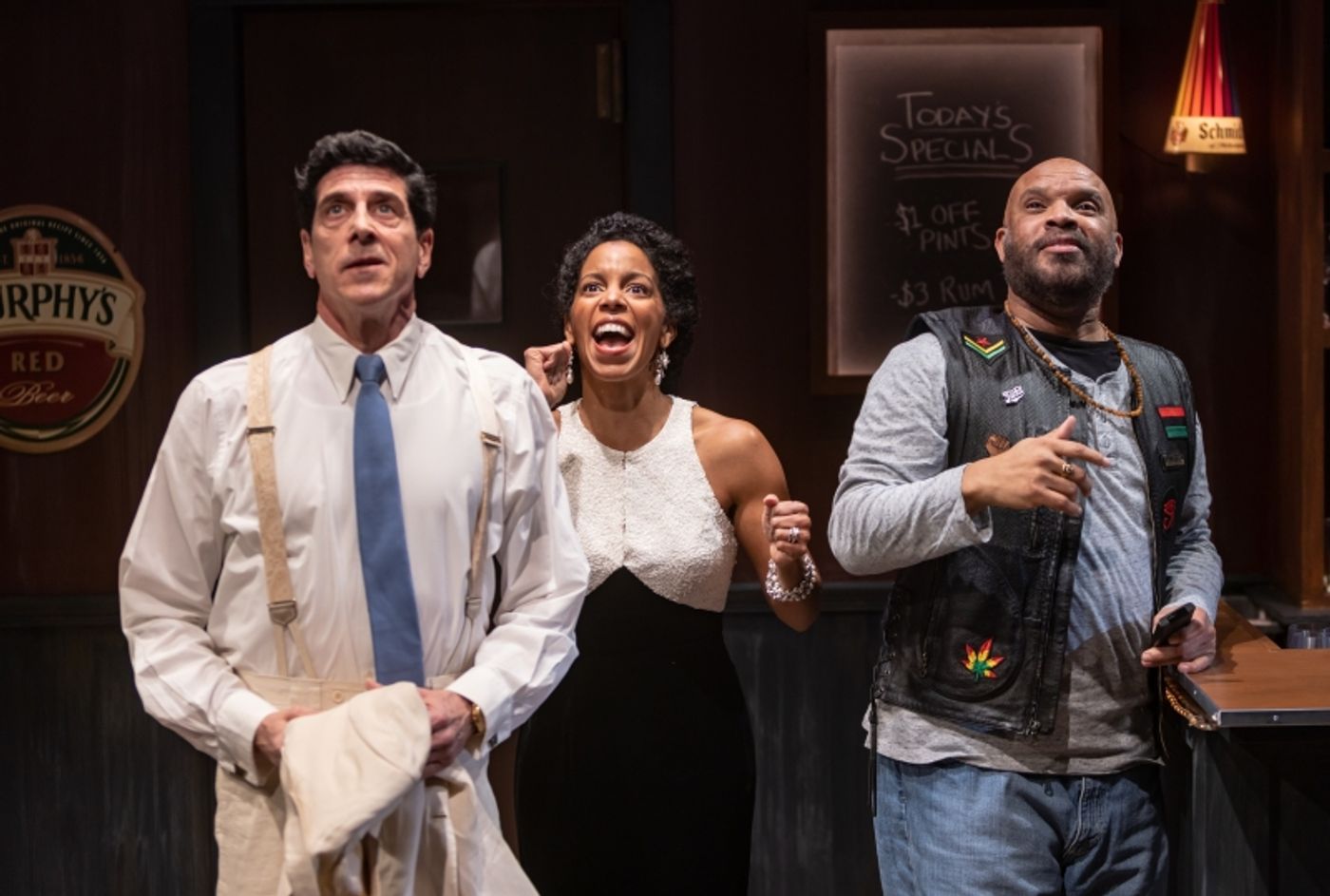Review: DAPHNE'S DIVE at Signature Theatre
A triumphant drama by Pulitzer Prize winning playwright Quiara Alegria Hudes, running through March 20th

Daphne's Dive at Signature Theatre. Photo by
Christopher Mueller.
Signature Theatre welcomes audiences back to their ARK space with Daphne's Dive, a dazzling, powerful and moving ensemble piece by Pulitzer Prize winning playwright Quiara Alegria Hudes that is perfectly suited to the intimate theatre space at Signature.
Daphne's - a neighborhood watering hole in north Philadelphia - is the dive bar of choice for an eclectic group of people who become a tight-knit, caring community over the 20 years that the play follows them. Like most neighborhood bars, it's familiar, cozy and comfy, but also a little care-worn and seedy. Scenic Designer Meghan Raham and Properties designers Kasey Hendricks and Pam Weiner have done an incredible job of creating the perfect space for Director Paige Hernandez and her talented cast to bring the story to life.
The story opens with Daphne (Rayanne Gonzales) pouring drinks and trading barbs with two of her regulars. Pablo (Jonathan Atkinson) is a starving artist that is currently obsessed with creating art out of people's garbage, and Rey (Jefferson A. Russell) is a free spirit who travels light on his Honda Goldwing motorcycle. They are soon joined by Daphne's sister Inez (Yesenia Iglesias) and her husband Acosta (James Whalen), an up-from-his-bootstraps businessman who is always looking for new worlds to conquer. Rey works to live (and as little as possible), and his past association with Acosta quickly leads to a new job offer. Next on the scene is Jenn (Quynh-My Luu), an impassioned young crusader for equality and social justice, fresh off her latest protest (and dressed in the revealing stars-and-stripes bikini that she wears to draw attention to her cause du jour). Rounding out the seven-person ensemble is Ruby (Jyline Carranza), a nine-year old who literally falls from the sky and into Daphne's life, as the opening scene ends.
Hudes has written characters that are complex and nuanced, with deftly interwoven plot lines. Each character has a well developed back story, and they all have secrets and scars that are revealed as the play unfolds. Their stories are told through a series of vignettes that check in on the denizens of the bar every four or five years. Each scene showcases the continuing story arc for each character, as they grow, age, and face ever evolving challenges.
The world they inhabit is raw and real, and Hudes doesn't shy away from tackling a wide variety of themes and issues: poverty, racism, inequality, crime, incest, marital infidelity and divorce, domestic violence, homosexuality, mental health, and suicide all impact their lives, but Hudes shows a deft touch by giving each theme a moment of focus, without overemphasizing any of them. And to her credit, she resists the urge to make any of the characters a foil for the others - every character is endowed with a strong voice. Their stories are not easy to watch - tragedy follows triumph like night follows day for all of them, but there are plenty of moments of situational humor and witty banter to provide a respite from the heavier parts of the play. Hudes paints a vivid, realistic picture, without becoming maudlin. Her characters fall, and rise again to face a new day's struggle. Their lives are stark, but not bleak - there are plenty of moments of music, dancing and joy amidst the struggles.

Hernandez and her accomplished, veteran cast make the most of the rich story and well developed characters they have been given to work with. Rayanne Gonzales inhabits the role of Daphne as if it were written for her, with an inner strength and emotional depth that is a pleasure to watch. Her pain is both physical and emotional, but the source of that pain is not fully understood until the very end of the show, in a surprise plot twist that is revealed without words: Gonzales' heart rending sobs and anguished, tear-streaked face leave no doubt about the past trauma that has left Daphne scarred for life.
Despite all that, Daphne is guardian and protector of all those that share her little world, even going so far as to adopt Ruby and raise her as her own daughter. Ruby may be the most challenging role in the play, and Jyline Carranza goes from a believable nine-year old to a 29-year old, alcoholic adult seamlessly. Along with Gonzales she does some of the heaviest emotional lifting in the show, including her own moment of unrestrained grief, which she shares with Atkinson's Pablo and Daphne. In the intimate ARK space, there is no faking tears; one can only imagine what kind of sense memories these brilliant actors have to recall, to bring forth such genuine, honest weeping.
Pablo is a character that would be easy to overplay, but Atkinson brings a light and gentle touch to the role, and never lets it stray into the tortured artist stereotype. Pablo's passion and creativity are on full display, as are his empathy and compassion. His dedication to his art brings energy to the story, and reminds us all of the importance of art and culture.
Inez and Acosta are the upwardly mobile power couple of the group, but they return to Daphne's because it's home. They've made it out of the inner city and into the suburbs, as Inez wryly notes when talking about how the Puerto Rican immigrants have "the biggest house on the street!" She makes a couple of jokes about the white neighbors that would come off as gratuitous cheap-shot laughs in the hands of a lesser actor, but Iglesias handles them with just the right delivery. Playing Inez is a balancing act in many ways - she works in a setting that serves the greater good, but she is also very concerned about appearances - and Iglesias makes the most of the moments the script gives her to shine.

Russell watch election results. Photo by
Christopher Mueller.
Acosta, by contrast, is more focused on opportunities and status. A successful businessman, he's most proud of the employment and economic development he's brought to his part of the city. He leverages that into an equally successful political career, but he quickly learns the moral and ideological price to be paid for moving up the political ladder. Whalen plays him with flair and panache, often doing his best work when he's reacting to others. Acosta doesn't speak as much as the rest of the group - he is, at his core, a man of action - and we learn more about him through the stories others tell about him, than we do from Acosta himself.
Where Acosta thinks locally, Jenn thinks globally, and in absolutes. There are no shades of grey for her, only wrongs to be made right. Her story arc forces Luu to transition the character from quirky young protestor to give-no-quarter activist somewhat quickly, and the intensity she brings to the role is remarkable. Where Jenn is an ideologue concerned about global issues, Acosta is practical and pragmatic, focusing on what can be done to make his corner of the world a better place. They make two perfect sides of the same coin.
And then there's Rey - the hedonistic, bohemian philosopher of the group. He participates less in the banal small talk of the group, but he observes, and then offers insight, frequently through longer, more substantial monologues. In one of the most understated and moving moments of the play, it's Rey who tells us why Acosta became so engaged in serving the community. Jefferson A. Russell does a masterful job of quietly taking charge of a scene, and Rey is the one who brings balance and perspective to many of the moments of crisis and tension that arise.
Each member of the cast contributes a sterling performance to this production, and Hernandez has melded them into a formidable ensemble, carefully orchestrating changes in pacing, pitch, volume and intensity to create a striking story. Her staging is natural and organic, with no extraneous movement. Carefully employed tableaus keep the action focused where it belongs. Scene changes are quick, and the flow of the show is impeccable. Hernandez has served the material well, and her directorial instincts are flawless.
The other members of the production team also deserve well-earned kudos. Moyenda Kulemeka's costuming creates just the right feel for each character. Attention to details help denote the passing years - for example, when we first meet Rey, he's wearing a bandana and amber aviator sunglasses; by the end of the show it's a driving cap, with reading glasses hanging from a strap around his neck. John D. Alexander's lighting is clean, with an underlying sophistication that uses the play of light and shadow to maximum effect. (A bit of soft light flickering on the faces of the people watching the unseen television, during the election night tableau, would have made a nice touch - but that's a very minor quibble.) Sound designer Kenny Neal has crafted a pre-show radio broadcast that combines period appropriate music and announcer segments, and then segues to a distant, offstage siren that sets the perfect tone for the start of the show. Similar radio treatments would have set up the chronological shifts that accompany each scene change nicely; perhaps budget and copyright considerations made that impractical. Likewise, a bit more ambient sound underscoring several of the scenes might have added an additional layer of patina to an excellent production.
An evening at Daphne's Dive will make you think, and take you on a stirring emotional journey, as you look at the world through the eyes of these seven beautifully flawed people. There's no happily ever after ending, but Hudes does a credible job of tying up the loose ends, and Hernandez and company will welcome you into their community. Go see Daphne's Dive - by evening's end you'll feel like a regular.
Running time is approximately 90 minutes, with no intermission.
Daphne's Dive runs through March 20th. For more information visit the Signature website here.
(Non-performance note: Ali's Bar has reopened at Signature, and it's a terrific spot for a delicious light bite and a drink before the show, at a very reasonable price. If you're looking for a place to eat before the show, it's a great way to support the programs at Signature.)
Reader Reviews
Videos

